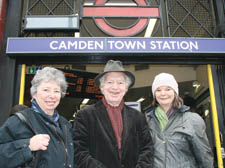|
|
 |
| |
 Underground poets Judith Chernaik, Gerard Benson and Cicely Herbet Underground poets Judith Chernaik, Gerard Benson and Cicely Herbet |
Ensuring that the Tube keeps getting verse
Poems on the Underground co-founder Judith Chernaik tells Dan Carrier how she brought Burns, Blake Shelley and Shakespeare to the daily lives of the capital’s commuters
Best Poems on the Underground. Edited by Gerard Benson, Judith Chernaik and Cicely Herbert.
Weidenfeld & Nicolson £16.99
THEY have raised smiles in the rush hour, brought some peace and solace to troubled minds on their way to or heading home from work.
They are part of the daily life of Londoners and a beacon of lyrical beauty on our city’s transport system.
Poems on the Underground, the scheme that sees advertising space given over to a few choice lines from the English language’s greatest lyricists, was launched in 1986.
And it is thanks in part to the inspiration of Britain’s two greatest and most progressive poets – the romantic Percy Bysshe Shelley, and the radical, alternative poet laureate who passed away last year, Adrian Mitchell.
The scheme to bring poetry to a mass audience was established by three friends who all live in Camden: Judith Chernaik, Cicely Herbert and Gerard Benson.
It was originally the brainchild of New Yorker Chernaik, who had been drawn to London in the 1970s by her love of Shelley.
She wanted to write about and research his life and work. Then, through mutual friends, Judith discovered Adrian Mitchell’s Dartmouth Park home was available to rent for a year. The mix of the 19th-century Romantic and living in the house of a man whose work is accepted as some of the finest political poetry the English language has produced was the starting point for the project. That, and exploring the Underground.
“I was doing research on Shelley and it struck me how he wanted his works read far and wide,” she recalls. But Shelley at first was not feted as he is now.
“He had to publish his own works, and even then at first no one bought them,” says Judith. “Then he fled to Italy, dogged by the response to his atheism and free love.”
Shelley wanted to ensure his words were read by as many people as possible, to have as wider influence as he could – and this concept Judith could not ignore. That was always something I believed in,” reveals Judith.
Then London life got to the New Yorker, and one aspect she loved was the Tube.
“I loved living in London, and I was particularly taken by the Tube system.
“I marvelled at the engineering and design. It is a testimony to the brilliance of the late 19th and early 20th century.”
Judith also recalls being impressed by the clever design and branding – including the famous Tube posters advertising the services, which included lyrics by the likes of Shelley, Wordsworth and Shakespeare.
It prompted an idea: Judith had noticed gaps on the walls on the trains, where adverts could be pasted.
“Why not use it for poetry?, I thought,” says Judith.
But she had no idea how to get the scheme off the ground.
“I didn’t know anyone so I addressed a letter simply to the ‘Manager, London Underground’, suggesting the idea,” she recalls.
“I said to them, ‘there are a lot of empty spaces on the Tube – can we put some poetry up there?’ To my amazement, they came back and said they were interested.”
Judith then saw an advert in the back of New Statesman from the Arts Council asking for ideas on how to disseminate poetry.
“We contacted them but it took years to get the funding,” she recalls.
“Philip Larkin was on the committee and he was very wary – they thought we were a bunch of dangerous anarchists.”
Adrian Mitchell’s home inspired Judith, but it was also his lyrics, of course.
“Perhaps the most popular poem we have had on the Tube was his four-line poem, called Celia, Celia, dedicated to his wife,” she said.
Now the trio have chosen 300 of the poems that have been read by literally millions of people for Best Poems on the Underground.
The idea has proved so popular that it has spread around the world. Judith’s home town New York took up the concept, followed by Shanghai, Dublin, Paris, Athens, Stuttgart, Stockholm, St Petersburg, Moscow, San Francisco, Barcelona and Sao Paolo.
Choosing the poems is simple, says Judith. “It is just a matter of personal taste,” she says. “We pick ones we like. Because there are three of us deciding what should be put up, a balance is struck. We have to think we are presenting poems in an unusual setting.
“There was a suggestion we should stick to contemporary poetry but we have found people love the early ones – Medieval, Elizabethan – but we find the language is still immediate and resonates.
“After all this time, I am still amazed at how successful this has been.”
|
 |
|
|
 |
 |
|
 |
|
 Underground poets Judith Chernaik, Gerard Benson and Cicely Herbet
Underground poets Judith Chernaik, Gerard Benson and Cicely Herbet
